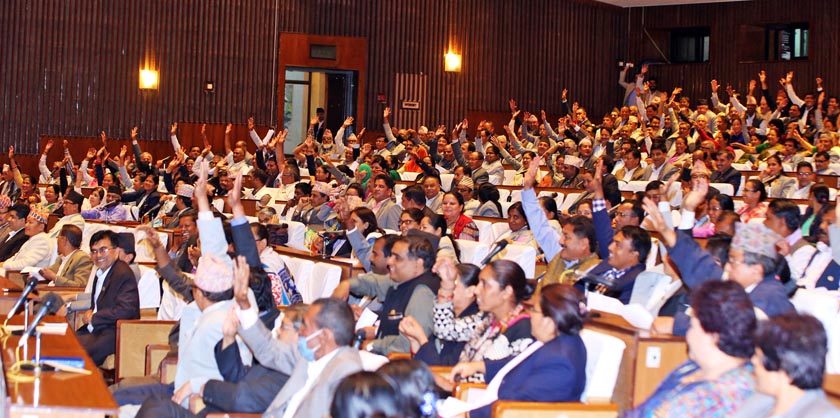'Rejection of the three budget bills won’t hit public financial system'
“The new government should revise the three bills and table them as fresh bills on a later date”
Kathmandu, July 22
The Parliament’s decision to turn down three budget-related bills with a majority vote will not paralyse the country’s public financial system in the coming days, experts said on Friday.
Lawmakers today rejected Financial Bill, Bill to Raise Public Debt, and Loan and Guarantee Bill tabled by the incumbent government right before prime minister-hopeful and CPN-Maoist Centre Chairman Pushpa Kamal Dahal tabled the no-confidence motion against incumbent Prime Minister KP Sharma Oli.
Although the three bills are important for proper implementation of the Appropriation Bill which has already been approved by Parliament their rejection will not make any difference either, Constitutional Expert Surya Dhungel told The Himalayan Times.
“This is because the three bills rejected today are accessory bills, whereas the main budget document, or the Appropriation Bill, has already been approved,” Dhungel said. Appropriation Bill is the legal framework that allows the government to roll out budgetary programmes as per funding allocations made by the government.
“But to properly implement the Appropriation Bill, the new government should revise the three bills that were turned down today and table them as fresh bills on a later date,” Dhungel said, adding, “The new government reserves the right to do so.” Similar comments were made by Nepali Congress lawmaker Prakash Sharan Mahat in the Parliament.
Of the three rejected bills, Financial Bill allows the government to collect taxes — the main income-generating source to finance programmes laid in the Appropriation Bill.
Part of the Financial Bill came into effect on the day budget was presented in the Parliament on May 28. This has enabled the government to collect many indirect taxes, such as customs and excise duties, as per the revisions proposed by the new Financial Bill.
The government has the authority to impose new tax rates even before the Financial Bill is approved by the Parliament, because of provisions laid in the Contemporary Tax Collection Act.
As per the Act, the government can introduce new tax rates by publishing a notice in Nepal Gazette. The validity of notices published in the gazette lasts for six months, which means the new government has to revise and ratify the Financial Bill by then.
However, while revising the Financial Bill rejected today, the new government may not get the leeway to reduce tax rates that came into effect on May 28.
If the government does so, it will have to reimburse taxpayers extra funds collected from the day the new duties came into effect, the act states. But if the tax rates are revised upwards while revising the rejected Financial Bill, the government cannot ask taxpayers to pay extra funds.
Of the other bills rejected today, the Loan and Guarantee Bill allows the government to borrow funds from abroad from sources like the World Bank, the Asian Development Bank and other foreign financial institutions.
This Bill has proposed that the government’s foreign debt ceiling be raised to Rs 700 billion from the existing Rs 500 billion.
But, as of April 12, the country’s external debt stood at Rs 380.7 billion, meaning the government still has room to borrow money using the previous ceiling.
Also, decision to reject the Bill to Raise Public Debt will not immediately have any impact, as the government does not need to mobilise loans from inside the country at the moment.






